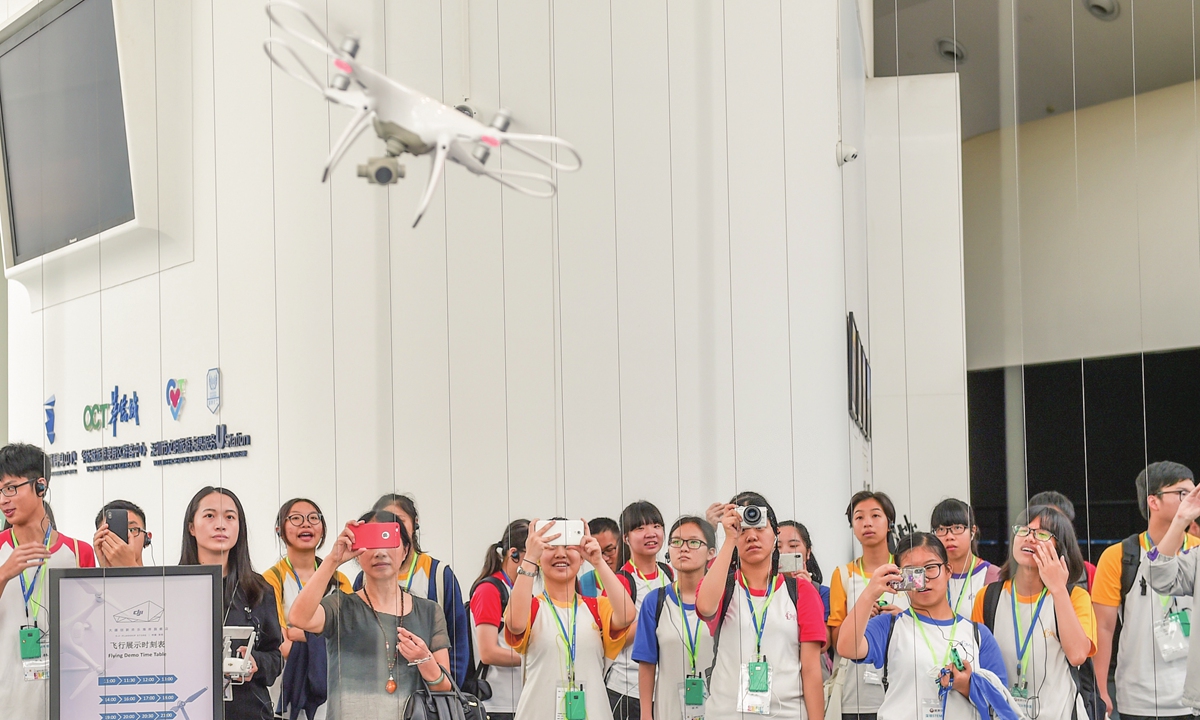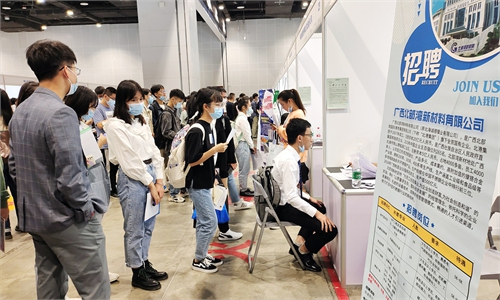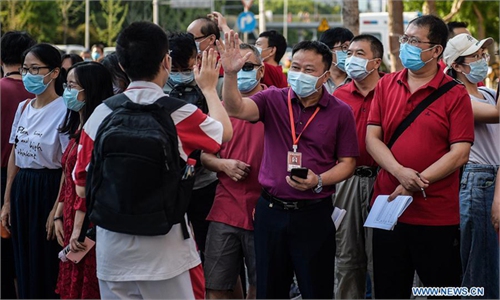Mainland universities first option for graduates in HK with 'attractive policies, job opportunities'

Students and teachers from Hong Kong visit a DJI flagship shop in Shenzhen, South China's Guangdong Province during a tour to witness the achievements of China's reform and opening-up in June 2018. Photo: Xinhua
With high school graduates in Hong Kong keeping their eyes on their next study destinations as the results of this year's Hong Kong Diploma of Secondary Education Examination (DSE) will be released in July, the Chinese mainland is expected to remain their first option.
According to the latest survey by the Hong Kong Special Administrative Region's (HKSAR) authority, the mainland ranked top among the destinations of university candidates from the city.
Experts said this is because of attractive policies for Hong Kong students as well as the advantages of some mainland universities' majors and disciplines in the market.
In April, the Hong Kong Education Bureau released a survey on this subject. According to the survey, in 2021, 5,645 secondary school graduates left Hong Kong for further study, accounting for more than 14 percent of Hong Kong secondary school graduates who continued full-time studies.
More and more students have come to the mainland in recent years, increasing from 1,229 in 2019 to 1,985 in 2021, a rise of 61.5 percent. Graduates from Hong Kong coming to the mainland accounted for about 35 percent, ranking first among the students leaving Hong Kong for further study, followed by 22.2 percent to the island of Taiwan and 21.8 percent to the UK.
As of January, about 18,430 Hong Kong students were pursuing higher education - including undergraduate and postgraduate education - in the mainland, up 11.3 percent from 2021.
During the 13th Five-Year Plan (2016-20) period, China's Ministry of Education continued to expand the channels for students from Hong Kong, Macao and Taiwan to study in the mainland, with over 400 colleges being qualified to recruit students from the three regions.
Hong Kong secondary school graduates with the DSE are exempted from the gaokao (the national college entrance examinations) in entering mainland universities.
They can also enroll by taking joint admission examinations held by mainland universities for students from Hong Kong, Macao and Taiwan.
Universities in the mainland will also accept recommendations from presidents of Hong Kong schools and provide special quotas for students from the HKSAR.
Li Xiaobing, an expert on Hong Kong, Macao and Taiwan affairs at Nankai University, told the Global Times on Tuesday that attracting and encouraging Hong Kong students to undertake further studies in the mainland with supporting policies is a long-term consideration.
Only through immersive and practical experience over a long period of time can these students have a profound understanding and recognition of their country, Li explained, noting that the Hong Kong students are expected to have their personalities reshaped, their patterns expanded, their horizons broadened and their values shaped through their studies in the mainland.
Also, compared with universities in Europe and the US, studying in the mainland tends to be a much safer option since the central government takes on more responsibility in epidemic prevention and control, which will be another consideration for these students' parents in decision-making, Li said.
In addition, the majors and disciplines of social sciences and business at universities in the mainland will build up a new platform for young people from Hong Kong, offering them more advantages in the huge mainland market, the expert noted.
In the long run, mainland universities will continue to attract Hong Kong high school graduates with growing prosperity and improving quality, Wong Ching-yung, principal of the Scientia Secondary School in Hong Kong, told the Global Times on Tuesday, noting that the increasing integration of Hong Kong's economy with that of the mainland will allow many people with both Hong Kong and mainland educational backgrounds to have more career opportunities.
Hong Kong will persist in emphasizing national education among its residents, which will enhance the young people's understanding of the country and raise their sense of national identity, which Wong believed will continue to attract them to the mainland for study and work.


